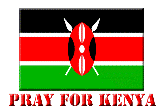I spoke to my folks earlier today to get an update on what is happening on the ground. I had spoken to my mum earlier in the week, and she was very low. So low to the point that she didn't want to talk, which is unusual for her. When I asked her what had happened, she said that she felt that she had been in denial since the election announcement, and now the whole thing had hit her, and it was hitting her hard. My mum is in her seventies, and is concerned, and worried about the whole situation.
She started off by saying that mysterious army people were going into people's homes in Nyanza province, and they spoke a funny language,(ie. language that the local people are not familiar with) that adds some weight to the
rumour about Ugandan troops in Nyanza. We have relatives there, who had passed on this information.
She was concerned about one of my aunts who runs a
matatu business in Kisii and Kisumu, and her safety. My aunt is not at home at the moment, and is bent on going back. We have concerns about her being ambushed by the
Mungiki on her way back to Western province. My aunt will make her own decisions, but in this current climate, I do not feel it is safe for her. Her cars could be stoned, burned, and her life could be threatened too. So in short my mother said she is going back for nothing. Whether my aunt will listen to our views is another story.
One of mum's staff had been stranded in Kakamega, since the 30th December, and was only able to return to Nairobi safely on Friday.
Mum has a small business, and she said things have come to a standstill. People are living from hand to mouth. Workers have no money. She has just been presented with a rent increase. Food prices have gone up because of the situation. Money is not coming in, and yet she has to eat, buy petrol and pay salaries. She said most small businesses were in the same position, she was not alone.
She feels that if things go on in this way, that a lot of small jua kali businesses will be wiped out. People will be out of work.
Then what will people do?Will crime increase as a result of this situation?I wish I had the answers to these questions, and the only thing that I was able to say to mum, was that we should continue to pray. She claimed that most Kenyans were praying, even the people who got us into this situation in the first place, which she felt was
hypocritical.She also raised her concerns about the role of the Catholic church in Kenya in this situation, and the fact that they have made it clear that they support the government. She was disgusted that
church leaders were not able to be honest peace brokers. Her view is that christians should not take sides.
She felt that the only businesses that were benefiting from this situation, were banks, mobile phone companies, and supermarkets. She said that most Kenyans were withdrawing what they could from the banks. The supermarket shelves were cleared by those who had money.
What happens to Kenyans who are not able to stock up, and live from hand to mouth?What happens to Kenyans who do not have fridges?Mum loves her
samaki, in fact she loves it so much she eats it every day. Well, there isn't any samaki getting to Nairobi, since this crisis started. The only samaki that is coming in, is from Mombasa, and she says it tastes different, and is expensive, and people don't like it.
The sukumuwiki(green leafy vegetable) that is available is not green but yellow.
Her point was with food, you take it or leave it, it is up to you. There is no fresh food about.
She is waiting for parliament to convene on Tuesday, and doesn't feel that it will be safe to be in town, when Parliament starts.She feels that
Kibaki will face a tough fight in Parliament. She has advised her staff that they will be working half day, but they are complaining that they have not made money, and need to earn money. She has told them that they can stay, however they do so at their own risk. Those who want to go home can, and those who choose to stay can.
I told her to tell her staff about Ushahidi, and that if they witnessed any violence, they could text in. She wondered what
Ushahidi would do with the information. I need to go back to their site, so that I can report back.
We ended the conversation with her feeling depressed and saying
this situation is not finished and it is not going to finish.Feel free to send in your own accounts of what is happening for your families back home, either via comments, or email.














